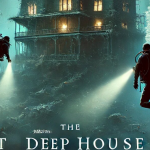“𝙏𝙝𝙚 𝙇𝙖𝙯𝙖𝙧𝙪𝙨 𝙀𝙛𝙛𝙚𝙘𝙩” (𝟮𝟬𝟭𝟱)

𝙏𝙝𝙚 𝙇𝙖𝙯𝙖𝙧𝙪𝙨 𝙀𝙛𝙛𝙚𝙘𝙩 𝙊𝙛𝙛𝙞𝙘𝙞𝙖𝙡 𝙏𝙧𝙖𝙞𝙡𝙚𝙧 #𝟭 (𝟮𝟬𝟭𝟱) – 𝙊𝙡𝙞𝙫𝙞𝙖 𝙒𝙞𝙡𝙙𝙚, 𝙈𝙖𝙧𝙠 𝘿𝙪𝙥𝙡𝙖𝙨𝙨 𝙈𝙤𝙫𝙞𝙚 𝙃𝘿
The Lazarus Effect is a 2015 science fiction horror film directed by David Gelb and starring Olivia Wilde, Mark Duplass, Evan Peters, and Sarah Bolger. The film explores the ethical implications of medical experimentation and the nature of life and death, weaving a chilling narrative that blurs the lines between science and the supernatural.
Plot Overview
The story revolves around a group of medical researchers led by Zoe (Olivia Wilde) and her fiancé Frank (Mark Duplass), who are developing a groundbreaking serum designed to bring dead patients back to life. After a successful demonstration on a dog, the team is excited about the potential applications of their research. However, their project takes a dark turn when a tragic accident occurs, leading to Zoe’s untimely death.
Determined to resurrect Zoe, Frank and the team use the serum on her, successfully bringing her back to life. Initially, Zoe appears to be unchanged, but it soon becomes apparent that the serum has altered her in unexpected and terrifying ways. She exhibits strange behavior and supernatural abilities, and the group grapples with the consequences of their actions. As the situation spirals out of control, the line between life and death becomes increasingly blurred, leading to horrific outcomes.

Themes
The Lazarus Effect delves into several thought-provoking themes:
- The Ethics of Science: The film raises questions about the morality of scientific experimentation, particularly when it comes to life and death. It challenges viewers to consider the potential consequences of playing God and the ethical dilemmas associated with advancing medical technology.
- Fear of the Unknown: The film taps into the fear of the unknown, particularly regarding death and what lies beyond. It explores humanity’s desire to conquer death and the unpredictable nature of such endeavors.
- Identity and Transformation: Zoe’s resurrection leads to a profound transformation, prompting discussions about what it means to be truly alive. The film questions the essence of identity and the impact of traumatic experiences on individuals.
Cinematic Elements
Visually, The Lazarus Effect employs a mix of suspenseful cinematography and atmospheric lighting to create a sense of dread. The film effectively utilizes jump scares and tension-building techniques to engage the audience. The score, composed by The Newton Brothers, heightens the tension, adding to the film’s eerie atmosphere.
The performances are a highlight, with Olivia Wilde delivering a captivating portrayal of Zoe, capturing both her vulnerability and the sinister changes that occur post-resurrection. Mark Duplass and the supporting cast contribute to the film’s emotional weight, portraying the complexities of their characters’ relationships amidst the unfolding horror.
Reception
Upon its release, The Lazarus Effect received mixed reviews from critics. While some praised its thought-provoking premise and engaging performances, others criticized it for its predictable plot and reliance on horror clichés. Despite this, the film has found a niche audience among fans of the horror and sci-fi genres, particularly for its exploration of existential themes.
Conclusion
The Lazarus Effect is a compelling blend of science fiction and horror that raises important questions about the ethics of scientific discovery and the nature of life and death. With its gripping narrative and strong performances, the film invites viewers to reflect on the potential consequences of humanity’s quest for immortality. While it may not break new ground in the horror genre, it offers a chilling exploration of the unknown and the price of defying nature.













